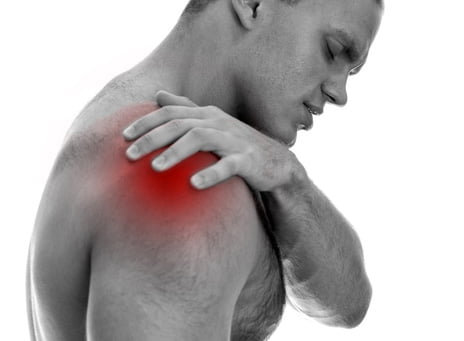 The rotator cuff comprises four muscles (and their respective tendons) that help to stabilise the shoulder and assist in its movement. These muscles are the supraspinatus, infraspinatus and teres minor and major. The shoulder joint is a ball and socket joint and can be injured as a result of overuse, wear and tear or excessive force. While sports/ athletics might result in overuse injuries and injuries related to excessive forces, ageing accounts for wear and tear problems in the shoulder. When the rotator cuff becomes injured, everyday activities such as raising your arm (above your head and out to the side), grooming, personal hygiene become increasingly difficult or impossible.
The rotator cuff comprises four muscles (and their respective tendons) that help to stabilise the shoulder and assist in its movement. These muscles are the supraspinatus, infraspinatus and teres minor and major. The shoulder joint is a ball and socket joint and can be injured as a result of overuse, wear and tear or excessive force. While sports/ athletics might result in overuse injuries and injuries related to excessive forces, ageing accounts for wear and tear problems in the shoulder. When the rotator cuff becomes injured, everyday activities such as raising your arm (above your head and out to the side), grooming, personal hygiene become increasingly difficult or impossible.Physiotherapy for rotator cuff injuries
Physiotherapy intervention is usually successful in the majority of cases. Your physiotherapist will begin with a thorough assessment of your condition, paying particular attention to your muscle strength, range of movement and ability to do everyday activities. Your treatment will focus on strength exercises (for the injured rotator cuff muscles) and stretching exercises. You may be asked to purchase some resistant bands (theraband) to use for your strengthening exercises. Your physiotherapist will progress your exercises as needed and indicated.
Surgery for Rotator Cuff Injuries
In the event that your shoulder does not respond to conservative management, you may require surgical intervention which your physiotherapist will recommend. Upon consultation with your surgeon, arthroscopic surgery to repair frayed and torn tendons and remove bone spurs and inflamed tissues around the shoulder can be organised. This procedure has a high success rate, however, it is important to note that you will still require intensive physiotherapy post operatively to help restore range of motion and strength.
To make an appointment to see a Physiotherapist about your shoulder injury, please contact us.